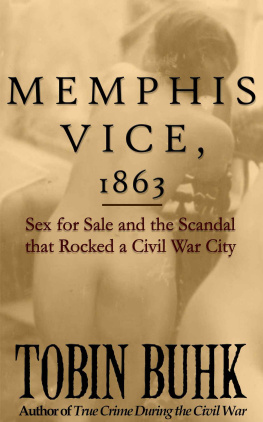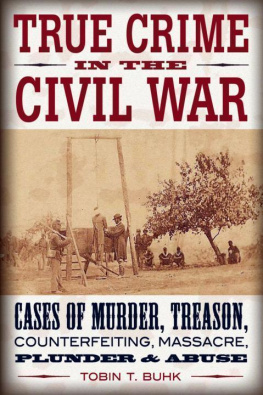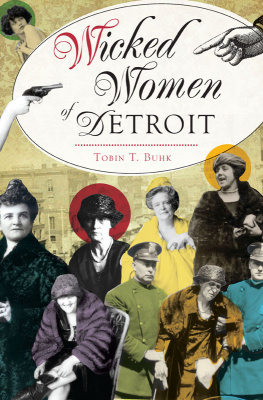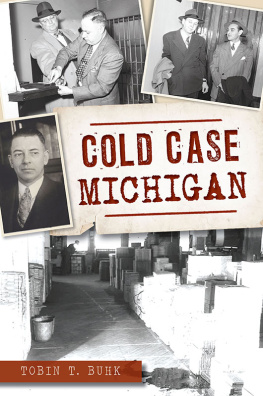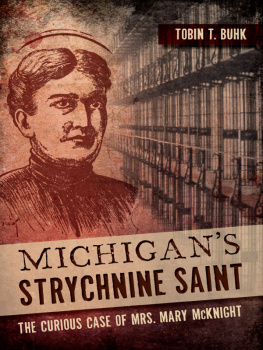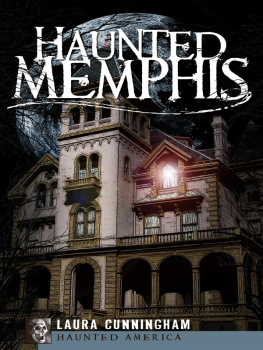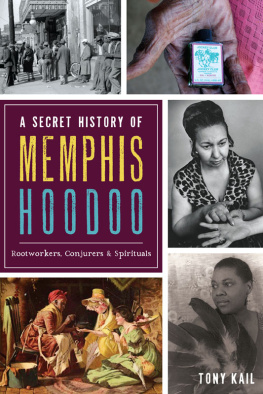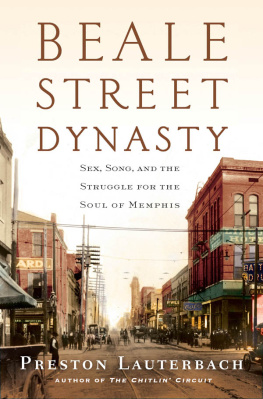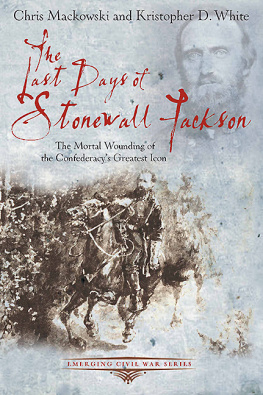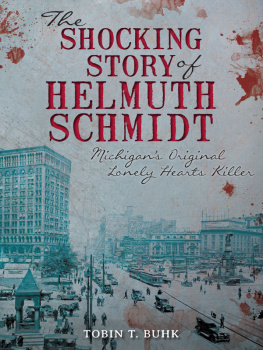Tobin T. Buhk
Copyright 2016 Tobin T. Buhk
No part of this book may be reproduced, distributed, or transmitted in any form or by any means, including photocopying, recording, or other electronic or mechanical methods, without the prior written permission of the author, except in the case of brief quotations embodied in academic works, critical reviews, and certain other noncommercial uses permitted by copyright law.
Cover Design by Tobin T. Buhk
Introduction: A Seedier Slice of the Civil War
A LITTLE-KNOWN BATTLE TOOK place in Memphis during the Civil War. Waged during the same approximate timeframe as the siege of Vicksburg (May 18-July 4, 1863), the Union militarys battle with prostitutes didnt involve bullets or bayonets or artillery. It wasnt fought by men in blue or gray uniforms.
The primary combatants fought on a much different battlefield. United States detectives, often detached soldiers from regiments encamped near Memphis, prowled the mean streets collecting evidence. They orchestrated arrests, participated in raids, and passed their evidence to judge advocates, who assumed the role played by modern prosecuting attorneys: they tried the cases in special military courts called Military Commissions.
Students of history dont learn about this murky event in class. This unreported battle doesnt appear in any textbooks, either. This event, which took place on the ground level of the Civil War, has fallen between the cracks of history.
I have always been fascinated by the Civil War at the ground level. Not the lofty battles fought for the glorious preservation of Union or for the dissolution of slavery. Not the politicians who waxed about the cause from their offices, or the generals, who shouted commands while perched atop their horses. But rather, the everyday folk who lived, loved, and sometimes died during the seismic event that left the United States split along fault lines.
For me, a crime writer, the most fascinating aspect of the period involves the villains and wrongdoers, particularly those civilians in occupied territory who were tried by military authorities. And from that group the most fascinating, and the hardest to unearth from the historical records, are the prostitutes.
The focus of this workUnion-occupied Memphis during the spring and summer of 1863contains several unique characteristics. It was a brief period during which military authorities attempted to end prostitution in the River City. The harder Union provost marshals pressed, however, the more trouble they had in trying to stop the unstoppable.
Sadly, few historical records about Memphis vice survive from an era when people didnt overtly or even covertly discuss sexuality. Sex workers, therefore, become very hard for a historical detective to tail since they scarcely left even a shadow in the historical record.
Thus, this work is more of an investigation than a textbook history. It is an attempt to recreate the Memphis of 1863, to bring the reader to street level to amble about, to smell the Tanglefoot whiskey, to see the Stars (the Memphis police) shine, to peek inside a bordello, and above all, to shed some light on the people who lived and worked in the shadows created by the street lampsat the ground level of the Civil War.
*****
A Tale of Two Papers: A Note about Sources
When it comes to the Memphis of 1863, there are two primary news sources: the Memphis Daily Appeal and the Memphis Daily Bulletin . Both present problems for the historian.
The arrival of Federal troops in June 1862 complicated things for the Memphis press.
The Memphis Daily Appeal s editors fled, but their presses continued to run as a newspaper in exile. Throughout the remainder of the war, the Appeal would continue to print, albeit from various spots throughout the Confederacy, daily coverage of affairs inside Memphis. This coverage is based on information leaking from the Union-occupied city to the Appeal s editors, who constantly had their ears to the ground listening for rumblings from the River City.
They also reprinted items from the Bulletin , which operated inside Union-occupied Memphis. For example, on April 9, the Appeal ran the same article about the Buttenburg-OBrien feud that appeared in the April 2, 1863, edition of their in-Memphis rival under the headline ASSAULT WITH INTENT TO KILL. (See chapter 4 for a discussion of this case).
Unfettered by restrictions placed on the press by Federal provost marshals, Appeal writers had the freedom to criticize Uncle Sams army. They also tended to seize on items about lawlessness in the Memphis streets as a way of exposing the inability of Union overseers to keep law and order.
Their colleagues in Memphis did not enjoy the luxury of criticism.
To ensure favorable coverage, Union army officials replaced the editors of the Argus with New York newspaper editors and suspended the Avalanche altogether. They also cut an order organizing a new paper, the Memphis Union Appeal , apparently an attempt to fill the vacuum left by the Appeal and to provide a pro-Union, pro-Lincoln voice.
By 1863, both publicationsthe Argus and the Union Appeal had ceased to exist, but the Avalanche had been bought by pro-Union editors, renamed the Bulletin , and returned to business (not to be confused with an antebellum paper by the same name that merged with the Avalanche in 1861). By 1863, the Argus also returned, but apparently few if any issues from the period covered in this book have survived.
The mostly pro-Union Memphis Daily Bulletin , therefore, is the only existing daily paper from 1863 to cover events in Memphis from inside Memphis. This is both a blessing and a curse to the twenty-first century researcher. The blessing comes on page three of each edition. Devoted to Local Matters, these items provide the only reliable glimpse at everyday life in 1863 Memphis.
These pages reveal, like a time capsule in microfilm, what life was like for people on the ground level in Memphis. Consider the coverage for late May, which reveals that Memphians suffered through an unseasonable cold snap; two boat loads of ice arrived in the Port of Memphis, one for the army encamped near Vicksburg, and another for private merchants in the city; and Doctor Peters, the infamous assassin of C.S.A. general Earl Van Dorn, was staying in town with the full blessing of the Union Army. (After supposedly catching Van Dorn with his wife Medora, Peters shot the general at his Spring Hill headquarters and fled. Some whispered that Peters agreed to assassinate the rebel horse soldier in exchange for the return of his land, which had been confiscated by the Federal army.)
Yet for all its value as a magical phone booth leading back in time, the Bulletin also comes with a caveat. In an era when one author went to prison for writing a glorified biography of slain Southern superhero Thomas A. Stonewall Jackson and a Maryland housewife earned a stint in prison for uttering the phrase that damned Lincoln, the editors of the Bulletin , while occasionally rankling the Union overlords, remained circumspect about criticizing the U.S. government.
In some cases, quite the opposite is true: perhaps realizing the power inherent in the Provost Marshal department, they tended to lionize Provost Marshals Melancthon Smith and Wager Swayne. Whether due to toadying or honest reverence, this fact alone raises questions about relying on the Bulletin as the truth, the whole truth, and nothing but the truth.
Nonetheless, the Bulletin was for all intents and purposes the only game in town . For minor crimes and misdemeanors tried in Recorders Court, page three of the Bulletin represents the sole remaining historical record. These types of crimes were marginal and thus exist not on the main street of history but along the sidewalks. And few historians have written about the events taking place on the sidewalks of the past.

